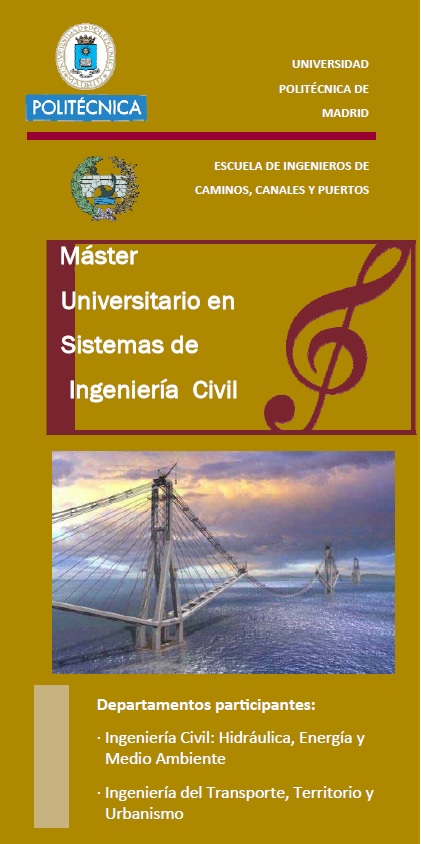You are here
Training Period
1. The Training Period
The main objective of the basic courses is to educate researchers of the highest level, capable of developing an academic career within the academic field with innovation, take part in research departments, development and innovation of private organizations in the field of engineering.
Civil engineering infrastructure systems are the main topics of the PhD program, considering the interactions between those fields and spatial planning.  The basic period of the PhD program is included in the Master in Civil Engineering System (MUSIC).
The Academic Commission of PhD Programme in Master of Civil Engineering System (MUSIC) evaluate students level student and decide the recommendable number of credits to complete MUSIC. These credits could be from 30 to 60 ECTS.
For its part, the student may apply for recognition of up to 5 ECTS credits for previous studies or research activities conducted within the framework of formal education at UPM or another university. These credits will be justified in terms of their subject and their teaching load in relation to the subjects of the formative period of the doctoral program. To apply the above recognition, the student must request the General Register of the School of Civil directed to the Academic Committee DOSIC.
For those students who have to do 60 ECTS, should take them from the Researcher Itinerary of the Master on Civil Engineering Systems.
Those students who only have to do the minimum required credits (30 ECTS), must be lodged as follows: choose from the following table 8 Common of Research ECTS (2 subjects). Also, choose a specialty and in it: 8 ECTS in subjects (2 subjects) and 5 ECTS for research training. Additionally must register for free 4 ECTS (belonging whether to the Common Research, to other specialty or the same specialty) and 5 ECTS in seminars.
 The subjects with ![]() can be given in English language depending on the number of registered students whose mother tongue is not Spanish
can be given in English language depending on the number of registered students whose mother tongue is not Spanish
3. Seminars
By following this LINK, you can access to the 2nd semester's seminars as wel as to its application form.
Â
4. Researcher Training Works.
Download the registration form for the research training works (in Spanish language)Â ![]()
Â
Researcher Training Jobs are an elective subject of the PhD on Civil Engineering Systems Training Period. Each of its specialtys worth a total of 5 ECTS credits, with a workload of between 125 and 135 hours, that must be distributed at least in one semester.
The Researcher Training Work must be an original work developed personally and indivudally by the student under the guidance of a tutor. This teacher will belong to one of the research groups involved in the Master on Civil Engineering Systems.
The student, therefore, must choose the research, including those offered by a R&D Group related to the program. The line of research proposed by the student must be in line with the rest of the subjects they are studying, which will be assessed by the Academic Committee or an ad hoc committee for this purpose, which is the committee that ultimately must give its approval to the proposal.
Once the line has been defined, the assigned tutor and the student must agree with the title of the Research Training Work (in both languages Spanish and English), fixing its scope and the specific conditions which must be developed. Although, as noted above, the work must be developed by the student on a personal and individual way, the tutor has to monitoring continuosly achieved progress. Therefore regular meetings are highly recommended, at least every two or three weeks.
Researcher Training Work should be translated into a document, or set of documents, containing at least the following information:
• Research Objectives
• State of art and information base
• Research methodology.
• Analysis of research results and conclusions
• References
Researcher Training Work can be writen in Spanish or English. In any case, the title as well as a summary of the work (with an extension between 300 and 500 words) will be written in both languages. The Academic Committee shall determine each year the deadlines for delivery of the research training works. The work will be finnished when the tutor has given his approval to the work, which must be translated into a reasoned report and sent to the Academical PhD. Committee , along with a copy (in PDF digital version) of the document.
Â
The evaluation of these works will be carried out within the Academic Committee, or by the ad hoc appointed committee. The tutor of each job will join the committee to propose a reasoned qualification for the work. Then, the Committee will decide the final qualification according to a scientic criteria.
The quliafication must be published within 24 hours in Spanish language, by a literally and numbered way, according to the following scale:
• Suspenso (< 5,0). (Failed)
• Aprobado (5,0 – 6,9) (Approved)
• Notable (7,0 – 8,9) (Good)
• Sobresaliente (9,0 – 10) (Very good)
Â


